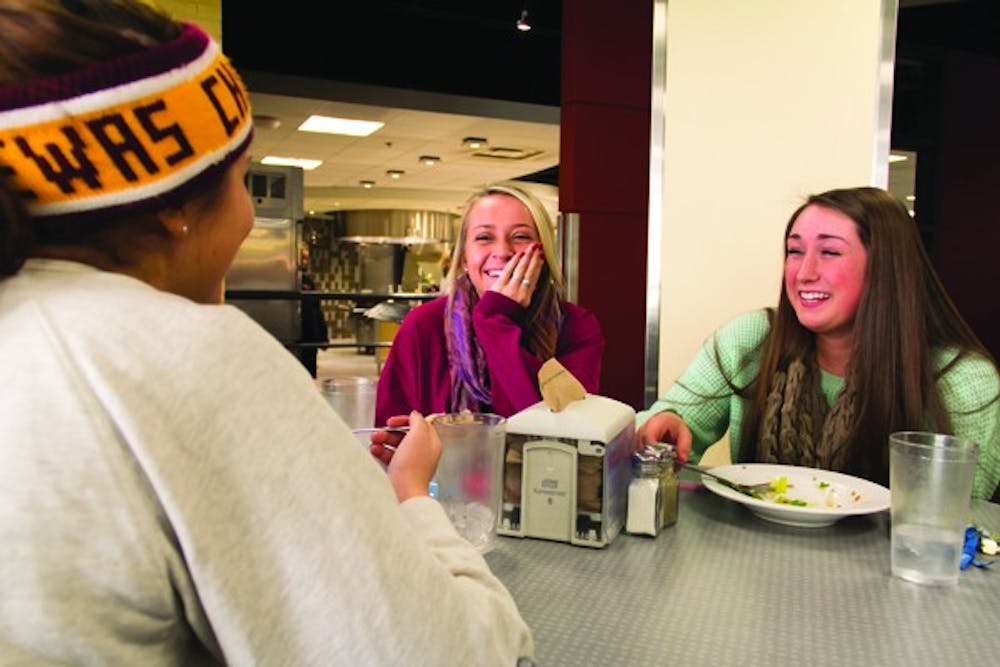Clean inspection showcases improved Campus Dining procedures

All of Central Michigan University’s campus dining facilities, run by third-party food contractor Aramark, were violation free in 2013, according to records provided by Central Michigan District Health Department.
Nikki Smith, Aramark Dining Services’ marketing manager, said food service directors of residential restaurants are responsible for any health report findings.
“If anything is found, most of the time it’s something very minor and can be corrected right on the spot,” Smith said. “If it’s something more than that, then the food service director is responsible for developing an action plan and making sure it’s implemented.”
Smith said CMU Campus Dining has a strong culture of safety, despite problems nearly seven years ago.
“It’s one of the most strong messages within our whole department that everybody’s aware of,” she said. “It’s not a fad. It’s a priority.”
The 2013 report is a stark change from the 2007 facility inspections, when Central Michigan Life reported multiple food inspection violations in the Merrill Hall Residential Restaurant.
Scott Jones, supervisor of environmental health for the health department’s Isabella County branch, said the now-spotless record is a sign of quality management by Aramark.
“The better the facility and the ability to have storage and room to do your business, all of these things contribute to being successful,” he said. “The larger the operation is, the more they have at risk if there ever becomes an issue.”
Violations in 2007 included warm food and evidence of rodent feces.
Robinson and Woldt Residential Restaurants also had opened packages without discard dates in 2007. Air gaps on drain lines were not visible at different locations throughout both restaurants.
Jones said inspections occur randomly on a semi-annual basis in order to correct mistakes before someone falls ill from food-borne illness.
Feeding thousands of students a day, Jones said the campus dining facilities have a reputation to uphold, and are inspected with much scrutiny.
All facilities inspected by the health department are evaluated by their respective menus, given either an X, Y or Z rating based on the content of the meals, Jones said.
“If you’re in the dining commons, your foods are cooked ahead of time and may be reheated to serve,” he said. “They would be inspected at a higher risk.”
Campus Dining has strict policies that follow the food from when it’s ordered to when it’s on a person’s plate, and every step in between.
Smith said Campus Dining adopts a ‘clean-as-you-go’ mentality.
“It’s not like once a week we pull something out and check off and clean,” she said. “It’s incorporated into our day-to-day safety culture.”
Student perspective on food safety
Tyler Booth has been washing dishes in The Towers’ Real Foods cafeteria since January 2013.
The South Lyon senior and part-time Aramark employee said he works with at least three full-time employees whose job is to clean the eating facilities.
“They’re doing that constantly,” he said. “They’re mopping and sanitizing. Even at every station, they have buckets of hot, soapy water and the other is sanitizer.”
Booth said the water in the buckets used to clean tables are changed every four hours.
Along with cleaning dishes during the week, Booth works in the produce area on the weekends.
“We have a list that shows every food’s guideline as to when it was opened,” he said. “It’ll say it stays fresh for two days, or seven days. Whatever it is, it has it on there. They stay to that standard. I’ve never seen anything that’s been past the expiration date.”
Even students who don’t have knowledge of a campus kitchen’s inner-workings said the dining facilities appear to be clean.
“I’ve been impressed with the facilities,” said Harrison Cassedy, a Dearborn junior. “You can see right now, everything’s kind of up to snuff. I trust it.”
His friend, Logan McCann, a Livonia sophomore, said CMU’s dining services breaks the common stereotype of bad cafeteria food.
“I think it’s a thing people have in their minds,” he said. “People hear the jokes about cafeteria food. I think the food is pretty good here.”
Campus dining survey to help deal with problems early
A new campus dining survey titled “Your Voice Counts” was launched by Campus Dining last fall. The document allows surveyors to provide feedback on their dining experiences.
Between Jan. 17 and Feb. 19, 194 Your Voice Counts surveys were completed. Nearly 8 percent of people indicated dissatisfaction with their dining experience, while a stronger 62 percent indicated high satisfactory with their dining experience.
“The rest kind of fall somewhere in the middle,” Smith said. “Someone can take the survey to say ‘I would like to see more veggie pizzas’ and they kind of fall into that middle part, where they were neither extremely satisfied nor extremely dissatisfied and they just want to provide feedback.”
Students and faculty can also provide feedback via the CMU Campus Dining Twitter and Facebook pages.
“We are committed to the safety and quality of the service that we provide,” Smith said. “We’re here to provide exceptional food experiences for the students, faculty and staff at campus and I know every single one of us is committed to that.”



